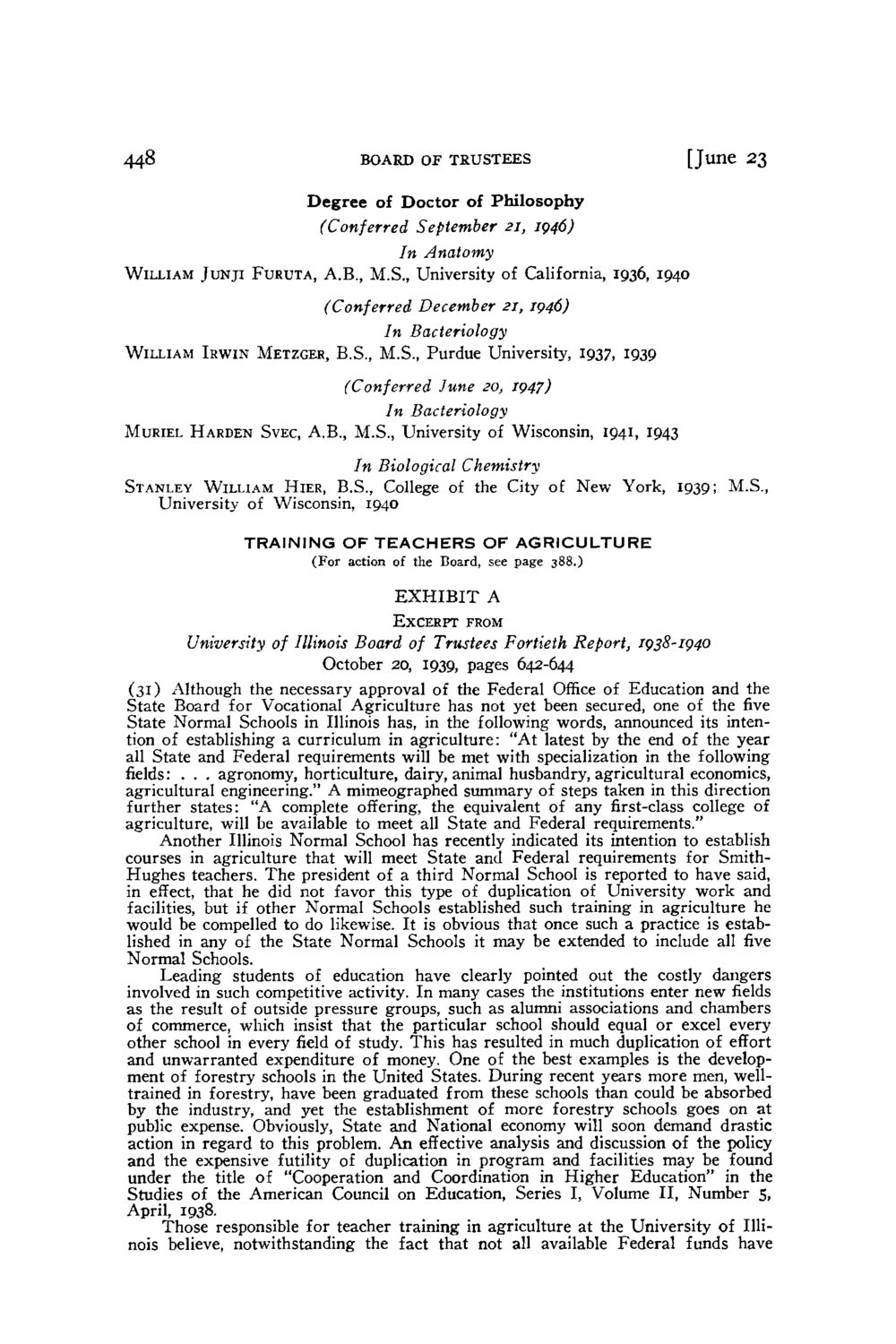| |
| |
Caption: Board of Trustees Minutes - 1948
This is a reduced-resolution page image for fast online browsing.

EXTRACTED TEXT FROM PAGE:
448 BOARD OF TRUSTEES [June 23 D e g r e e of D o c t o r of P h i l o s o p h y (Conferred In (Conferred In September 21, 1946) Anatomy December 21, 1946) Bacteriology W I L L I A M J U N J I FURUTA, A.B., M.S., University of California, 1936, 1940 W I L L I A M I R W I N METZGER, B.S., M.S., Purdue University, 1937, 1939 (Conferred June 20, 1947) In Bacteriology MURIEL HARDEN SVEC, A.B., M.S., University of Wisconsin, 1941, 1943 In Biological University of Wisconsin, 1940 Chemistry 1939; M.S., STANLEY W I L L I A M H I E R , B.S., College of the City of New York, TRAINING OF TEACHERS OF AGRICULTURE (For action of the Board, see page 388.) EXHIBIT A EXCERPT FROM University of Illinois Board of Trustees Fortieth Report, 1938-1940 October 20, 1939, pages 642-644 (31) Although the necessary approval of the Federal Office of Education and the State Board for Vocational Agriculture has not yet been secured, one of the five State Normal Schools in Illinois has, in the following words, announced its intention of establishing a curriculum in agriculture: "At latest by the end of the year all State and Federal requirements will be met with specialization in the following fields: . . . agronomy, horticulture, dairy, animal husbandry, agricultural economics, agricultural engineering." A mimeographed summary of steps taken in this direction further states: "A complete offering, the equivalent of any first-class college of agriculture, will be available to meet all State and Federal requirements." Another Illinois Normal School has recently indicated its intention to establish courses in agriculture that will meet State and Federal requirements for SmithHughes teachers. The president of a third Normal School is reported to have said, in effect, that he did not favor this type of duplication of University work and facilities, but if other Normal Schools established such training in agriculture he would be compelled to do likewise. It is obvious that once such a practice is established in any of the State Normal Schools it may be extended to include all five Normal Schools. Leading students of education have clearly pointed out the costly dangers involved in such competitive activity. In many cases the institutions enter new fields as the result of outside pressure groups, such as alumni associations and chambers of commerce, which insist that the particular school should equal or excel every other school in every field of study. This has resulted in much duplication of effort and unwarranted expenditure of money. One of the best examples is the development of forestry schools in the United States. During recent years more men, welltrained in forestry, have been graduated from these schools than could be absorbed by the industry, and yet the establishment of more forestry schools goes on at public expense. Obviously, State and National economy will soon demand drastic action in regard to this problem. An effective analysis and discussion of the policy and the expensive futility of duplication in program and facilities may be found under the title of "Cooperation and Coordination in Higher Education" in the Studies of the American Council on Education, Series I, Volume I I , Number 5, April, 1938. Those responsible for teacher training in agriculture at the University of Illinois believe, notwithstanding the fact that not all available Federal funds have
| |